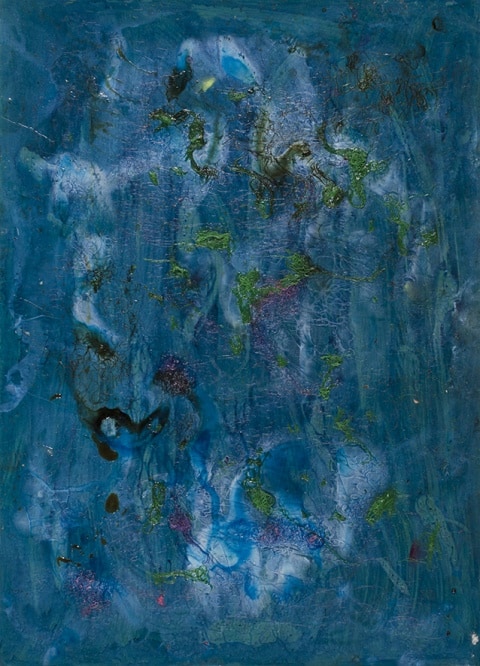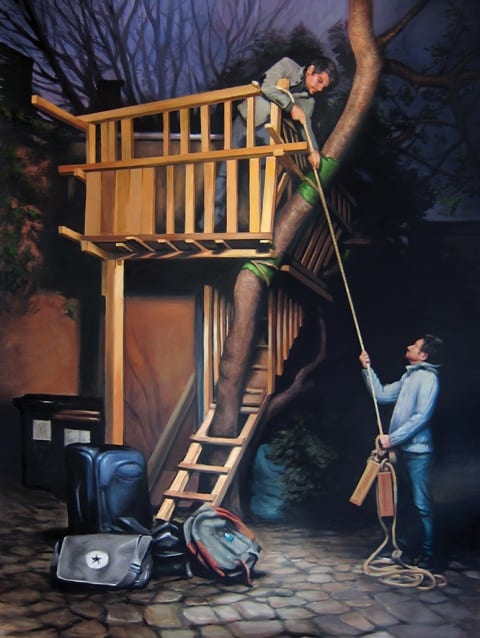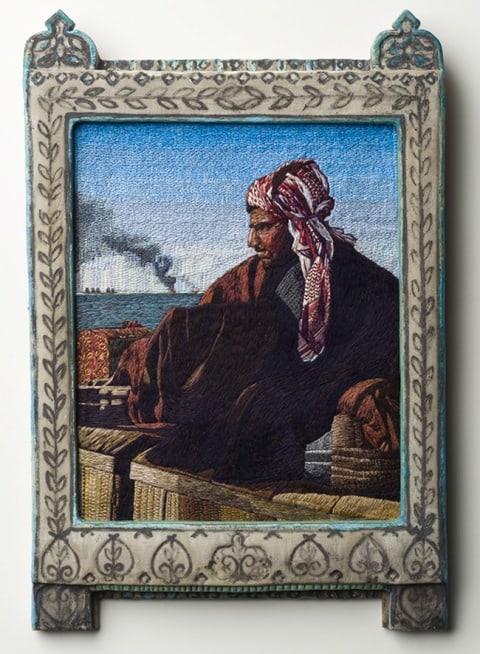During the run of X HOMES, a documentary theatre programme staged in Johannesburg in July, the Canadian writer, filmmaker and photographer Bruce LaBruce chatted with Cape Town experimental haute couturier and performance artist Athi-Patra Ruga about life on the move
Athi-Patra Ruga, July 2010. Photo by Ant Strack
Bruce LaBruce: We met on Facebook. The photos of you are so different from how you look now. It seems like you’ve made some transformation, not only physically but also style-wise. How did that come about?
Athi-Patra Ruga: It was triggered by my move from Johannesburg, where I lived since I was 16, to Cape Town. Which seems almost backwards or reverse. Most people come to Johannesburg. I’m originally from the Eastern Cape, Umtata, so it was like going home. I like the rediscovery of old basic things. Johannesburg takes that away from you. It’s such a hectic city. Everyone says Cape Town is way more racist than Johannesburg. I don’t know. It is a very mean fallacy and just plain jealousy.
I think a lot of things are entrenched in Cape Town. There was slavery, which is something Johannesburg doesn’t understand, even though there was the mining thing. It is different. Cape Town is old world, Johannesburg is part of the mining and industrialisation and the whole thing that it caused with South Africa and its history. That’s the difference. That’s why Capetonians are seen as frivolous in expression, more so than Johannesburg. Do you think Cape Town is getting a bad rap?
As an artist, I think that Johannesburg has a great work ethic and I think one needs that. It is the same as Berlin where everyone is working towards one goal. In Cape Town there is more of a sense of community, which is a good thing sometimes, if you really want to exchange old, old ideas with new ideas. Someone was ragging on Johannesburg, saying the people here are so cynical and world-weary and over everything. I can relate that to some people. [Laughs]… whereas Cape Town has a bit more naïveté or joie de vivre… Frivolity! I think it is more frivolity. One shouldn’t underestimate that. Things shouldn’t be taken seriously all the time. Johannesburg tries to do that. It is the first time I’ve been back in two years and it has been quite a strange return.
Athi-Patra Ruga, …Votive portrait (umthondo Wesizwe), 2009, thread on tapestry canvas, 74x 94 cm. Courtesy Whatiftheworld Gallery
Try to encapsulate what the difference is coming back. Not much has changed. I thought a lot would change. But why is it such a different experience for you? Because you’ve changed?[Laughs]
I don’t know. Maybe you’re right. I think I’m really trying to separate myself from Johannesburg as much as possible. It is a very hard city. So moving back to Cape Town, you’re geographically closer to the Eastern Cape. Geographically, historically – I’m closer to the traces of my people and my family. And I have some stability at last. But Cape Town has also reconnected me to so many things I would rather forget about the Eastern Cape. I think I’m still going through a phase where I’m making peace with growing up in a small town, a kind of post-adolescent pragmatic rage, maybe. [Laughs] After this I can move anywhere.
Would you consider leaving Africa?
Oh yes.
Are you going to?
I would like to.
Where?
Berlin, of course. Because I think it reminds me of Johannesburg, a hybrid of Johannesburg and Cape Town. There is a choice for quality and viewing yourself as quality goods, and there is focus on simpler things. And then the hardcore, very fastpaced thing.
What about the art world there?
I think it would be quite something to penetrate. I’m just giving myself time in this country. There is a lot to be done, a lot.
I’m in an inter-racial marriage. My husband is Cuban; he’s mixed-race but identifies himself as black. Despite the multiculturalism of Toronto, the downtown core is still very white. You can go to downtown bars and a lot of bars are white. He always says: “Bruce-sita, I’m leaving. I’m the only black person here. I’m not into it, the music.” So how would you feel about living in Berlin where it is mainly white? Would that be liberating?
No, but I don’t come from a place where that defines me much. I have a mixture of friends from different races. I don’t think I’m of that time that pays attention to that thing, unless you walk into a place where they sell rugs and the security guard follows you thinking you’re going to walk out the shop with a rug.
Of course, every day you’re reminded that you’re black. It comes with this thing. I think it is a nice thing to identify with, but… You would become almost like a fetish in Berlin for a lot of people, in way.
I wouldn’t because I would try and recreate my reality. I am very roosty and homely, because that makes me stronger and capable of dealing with outside elements. I think I will be able to do it, although not be as social. I think one has to be strong for such things and have a thick skin. But difference will always be there.
Bruce LaBruce is Toronto based film-maker, writer, and photographer
Athi-Patra Ruga’s solo exhibition ‘Teeth are the only bones that show…’ is at Whatiftheworld Gallery, October 6 – November 6, 2010



